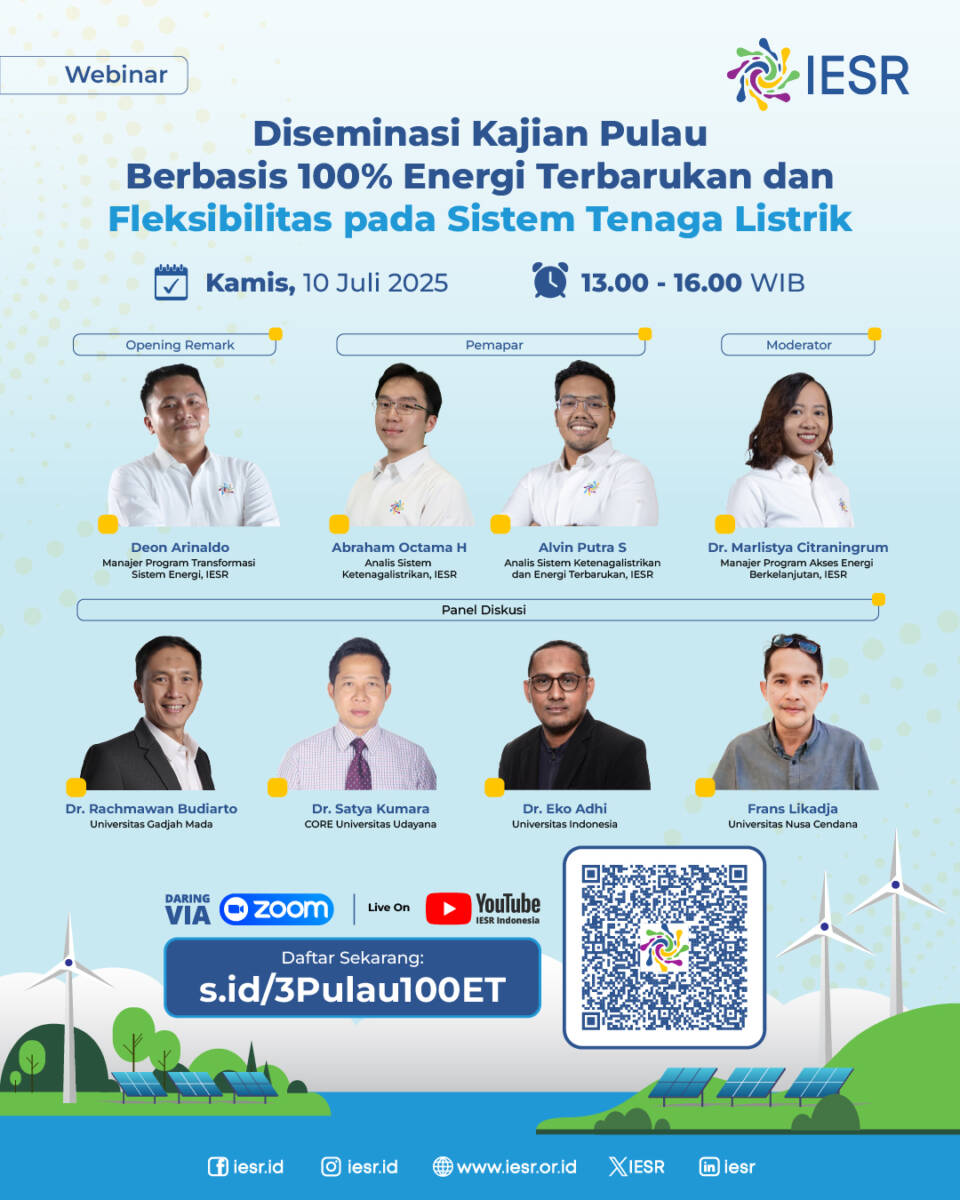
Dissemination Webinar of Island Studies Based on 100% Renewable Energy and Flexibility in Electric Power Systems
Replay Event
Background
In the Enhanced Nationally Determined Contribution (ENDC) document, the Indonesian government has set a target of reducing energy sector emissions by 358 million tons of CO₂eq by 2030 through domestic efforts. In line with this, Indonesia is also committed to achieving Net-Zero Emissions (NZE) in the energy sector no later than 2060. To achieve this, the National Electricity General Plan (RUKN) projects the need for installed capacity of up to 443 GW by 2060, consisting of 41.5% variable renewable energy (VRE) generation, 34 GW energy storage systems (BESS), and 58.5% dispatchable generation. The development of a super grid to connect the national electricity system, which is still fragmented, is a major prerequisite.
However, by the end of 2024, the installed capacity of renewable energy has only reached 14.89 GW or around 15% of the total national capacity, and only 1.1 GW comes from VRE. This development is still far from adequate. Infrastructure limitations and the intermittent nature of VRE are often cited as reasons for the slow integration of renewable energy, so strengthening the electricity network and inter-island interconnection is very crucial. RUKN estimates that the investment requirement for this infrastructure is around USD 2.87 billion per year.
Answering this challenge, IESR conducted a study on the potential for 100% renewable energy electrification on islands that are not yet connected to the main system. The results of the study show that Timor Island (NTT) and Sumbawa Island (NTB) have the potential to meet their electricity needs entirely from renewable energy and achieve NZE before 2050.
For Timor Island, the optimal scenario requires a generating capacity of 6.2 GW in 2050, dominated by solar power (97.1%), and a BESS system of 14.14 GW. The annual investment is estimated at around USD 186 million during 2026–2050. Meanwhile, Sumbawa Island requires 2.23 GW of generating capacity, dominated by solar and wind, and 1.96 GW of BESS, with an annual investment requirement of USD 197 million.
In addition, IESR also examines the flexibility of the electricity system, with a case study of Sulawesi Island. It is projected that in 2060, 42% of the total electricity production of 119 TWh will come from VRE. BESS will play a vital role by contributing 72% to daily flexibility needs, while interconnection and dispatchable generation such as hydro and bioenergy will be important for weekly and seasonal flexibility. The cost of Sulawesi’s system flexibility is estimated to be between 3.59–9.64 cents USD/kWh, depending on the portion of contributions from interconnection and other flexible generation.
As part of the effort to disseminate these findings, IESR will organize discussions with educational institutions related to the findings of the 100% Renewable Energy Based Island and Electric Power System Flexibility. This event aims to encourage strategic discussions towards a clean, reliable, and sustainable energy system.
Objectives
This activity is held to achieve two main objectives:
- To deliver the latest study results on the potential for a 100% renewable energy-based electricity system transition in Timor Island (NTT) and Sumbawa Island (NTB), as well as an analysis of the flexibility of the electricity system in Sulawesi, which are relevant for the development of future energy research and policy.
- To encourage critical and participatory discussions with academics and other stakeholders to further examine the findings and recommendations of the study, and to open up opportunities for collaborative research and development of energy transition technology at the local and national levels.
Presentation
Flexibility in Power System Development Sulawesi Case Study – Abraham Octama Halim – IESR
Flexibility-in-Power-System-Development-Sulawesi-Case-Study-Abraham-Octama-Halim-IESRSpeakers
-
Deon Arinaldo - Director of Energy System Transformation Program - IESR
-
Dr. Rachmawan Budiarto - Gadjah Mada University
-
Dr. Satya Kumara - CORE Udayana University
-
Frans Likadja - Nusa Cendana University
-
Dr. Eko Adhi Setiawan - Associate Professor Universitas Indonesia
-
Alvin Sisdwinugraha - Head of Energy System Modelling and Analyst - IESR
-
Abraham Octama - Power System Analyst - IESR

